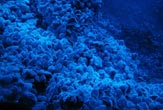Mussels Disappear from Streams and Dinner Plates

Freshwater mussels may start disappearing from dinner plates as species increasingly become extinct or endangered by human activities, scientists say.
North America has historically had a very diverse community of freshwater mussels, but populations have been on the decline for the past few decades. Mussels now are one of the most endangered groups of animals on the continent, according to the U.S. Fish and Wildlife Service.
Humans are primarily responsible for the disappearance of mussels through water pollution and changes to their physical habitat wrought by the construction of dams, dredging and the introduction of exotic species.
Recent studies, detailed in a special section of latest issue of the journal Environmental Toxicology and Chemistry, have narrowed down the pollution and habitat factors, finding that mussels are particularly sensitive to copper, ammonia and several pesticides, which can wash into streams from surrounding land.
Ammonia is a major issue in North Carolina, wrote researcher Teresa Newton of the U.S. Geological Survey in La Crosse, Wisconsin. And current water quality standards for copper may not protect mussels in Oklahoma and other states, according to a team including Christopher Ingersoll of the USGS in Columbia, Missouri.
In addition to being tasty appetizers, these shiny brownish bivalves are a critical component of the food chain because they provide food for other aquatic animals and for some land animals.
They also help to cycle nutrients and energy in streams and lakes by filtering algae, bacteria and organic matter from the water column.
Get the world’s most fascinating discoveries delivered straight to your inbox.
Of the estimated 300 species of freshwater mussels found in North America, 35 are already extinct, with another 70 listed as threatened or endangered under the U.S. Endangered Species Act. Still another 180 species are critically imperiled or vulnerable.
- Top 10 Species Success Stories
- Images: Endangered and Threatened Wildlife
- Mussels Evolve in an Evolutionary Heartbeat

Andrea Thompson is an associate editor at Scientific American, where she covers sustainability, energy and the environment. Prior to that, she was a senior writer covering climate science at Climate Central and a reporter and editor at Live Science, where she primarily covered Earth science and the environment. She holds a graduate degree in science health and environmental reporting from New York University, as well as a bachelor of science and and masters of science in atmospheric chemistry from the Georgia Institute of Technology.


